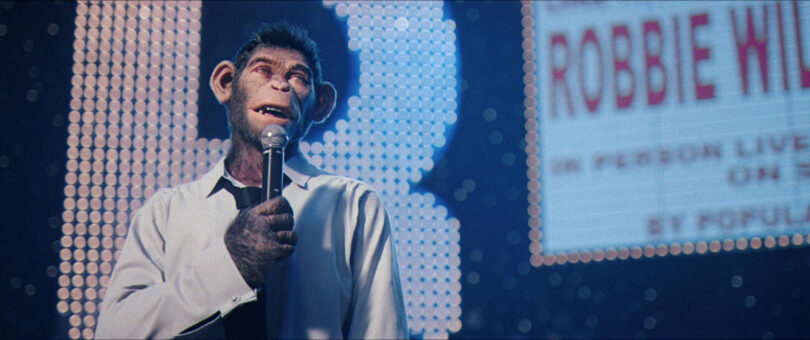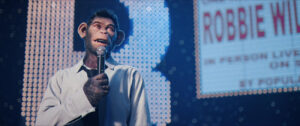OK, this is embarrassing, but I also think it’s funny, so I’ll ‘fess up.
I was watching “Better Man” (R, 134 minutes, in theaters), the film bio of British singer Robbie Williams, and I kept wondering:
Where’s Carlos Santana?
The guitarist was a no-show, which baffled me. Didn’t Williams and Santana collaborate on the smash hit “Smooth”?
So I looked it up afterward.
Surprise! Robbie Williams is not Rob Thomas.
Thomas, lead singer for the band Matchbox Twenty, sang “Smooth.”
Ouch.
Williams was in a popular boy band, Take That, before launching a solo career. Williams is a very big deal in Great Britain, where he’s had a slew of hits, and pretty much everywhere – except the United States.
We learn a lot about his life and career in “Better Man,” directed by Michael Gracey (“The Great Showman”).
In recent years we’ve seen lots of biopics of music superstars – Elton John, Amy Winehouse, Freddie Mercury, Bob Marley and so forth. But this movie is different.
Throughout the film, Williams inexplicably appears as a chimp.
It’s a stroke of genius.
It’s weird, it’s funny, and, yes, it’s a gimmick, but what an inspired one.
Recent stories about the movie have mentioned two reasons why this approach was taken:
1) Williams has been known to liken himself to a performing monkey.
2) People (according to Williams) like animals more than humans – and might be more sympathetic to his flawed character as a furry critter.
Whatever the reasoning, the audacious choice works. The chimp visage does make the flawed character more sympathetic.
Williams provides the first-person narration and shares the singing with Adam Tucker, and those are his eyes on the CGI-generated chimp face, while actor Jonno Davies provides the movements and the speaking voice.
It’s unlikely “Better Man” would be as interesting with a more traditional approach. It tells a familiar story. A young underdog gets a few breaks and becomes a superstar. A combination of drugs, alcohol, sex and ego bring the world crashing down on the hero. Sometimes in these films, as with Elton John, there’s a rebirth. Sometimes, as with Amy Winehouse, there isn’t. Essentially, though, it’s the same pattern.
“Better Man” begins with Williams as a youth brought up to idolize the likes of Rat Packers Frank Sinatra, Dean Martin and Sammy Davis Jr. by his small-time crooner father, Peter (Steve Pemberton). After Peter abandons the family, Robbie – then known as Rob – stays with his supportive mom, Janet (Kate Mulvany), and his beloved grandmother, Betty (Alison Steadman).
At 16, Rob tries out for a boy band, displays his cockiness during the audition, and gets chosen. He figures he stood out for being “a cheeky little bastard,” but this brash attitude – along with snorting mounds of cocaine and other questionable behavior – is what gets him in trouble down the road as he clashes with the manager and other members of what will become the hugely successful Take That.
Going solo, he romances Nicole Appleton (Raechelle Banno) of the girl-group All Saints, parties with bad-boy brothers Liam and Noel Gallagher of Oasis, and struggles with self-doubt, envy, feelings of abandonment (thanks, Dad), the pitfalls of stardom, and so forth.
This portrait of Williams’ roller coaster life and career is enhanced by his catchy pop hits and an especially clever song-and-dance sequence set on London’s Regent Street to the tune of “Rock DJ.” And Williams’ self-described cheekiness adds pizazz to the proceedings. The film runs long, dragging with self-congratulatory excess at the end (Williams served as executive producer), but, overall, it’s entertaining.
Thanks largely to the chimp business.
Plus, if you’re like me, you might come away learning the difference between Rob Thomas and Robbie Williams. *** (out of four)
Anderson takes a chance
Pamela Anderson is best known for “Baywatch” and a sex tape co-starring then-husband Tommy Lee.
Now she’s going against type, sort of, in “The Last Showgirl” (R, 88 minutes, in theaters). She plays Shelly, an aging Las Vegas showgirl who’s left reeling when she learns that Le Razzle Dazzle, the revue she’s performed in for the past 30 years, is about to close due to low ticket sales.
Shelly struggles to decide what she’ll do next. She’s built her life around performing in the show, which she loves.
Meanwhile, her adult daughter, Hannah (Billie Lourde), comes around to express resentment over the fact that she was left with another family to raise her. Shelly’s younger fellow showgirls, Jodie (Kiernan Shipka) and Mary-Anne (Brenda Song), who view her as a maternal figure, start auditioning for more popular, sexually provocative Vegas shows that Shelly finds tasteless. Her best pal, Annette (a heavily made-up Jamie Lee Curtis), a former showgirl who’s now a cocktail waitress, tries to give Shelly support, but she’s struggling with her own alcohol and gambling issues. Then there’s Eddie (Dave Bautista), the revue’s producer, who clearly cares about Shelly: Is there a future with him?
While dealing with all of these people in her life, Shelly must confront the likelihood that, just as time has passed by Le Razzle Dazzle, her life as a showgirl is over. As she’s told at one point, she was hired as a showgirl for her youth and sexy looks, and she no longer fits the bill.
You can see why the role might appeal to Anderson, a longtime sex symbol who, like her character, is 57 years old. Like Demi Moore in “The Substance,” she gives an impressive, vulnerable performance in a film about aging and our society’s shallow standards of beauty. It’s no great wonder that she’s been nominated for the Screen Actors Guild award and has received other accolades.
Bautista also stands out as Eddie, a seemingly nice guy who struggles to adapt to life’s curveballs.
But, overall, the film, directed by Gia Coppola (granddaughter of Francis Ford and niece of Sofia) and written by Kate Gersten (“Mozart in the Jungle”), doesn’t quite work.
It runs just 88 minutes – 82 before the final credits begin. But, even then, it seems stretched out, as if there weren’t enough material for a feature-length film. There are lots of cuts to redundant scenes of Shelly agonizing over her situation while walking around, looking in a mirror, smoking or whatever; there’s a short, contrived scene of Annette taking time out from her waitress duties to relive her glory days with a dance routine.
It all comes across as filler.
The scenes involving Shelly’s daughter, Hannah, are trite and, at the end, unconvincing, while a subplot involving Shelly’s young friend Jodie comes and goes without much of a resolution. The entire ending, for that matter, is a letdown.
Still, it’s worth a look for Anderson and Bautista. **
** Click here for Tim Miller’s previous movie columns for Cape Cod Wave **
Please like Cape Cod Wave on Facebook.
Cape Cod Wave Magazine covers the character & culture of Cape Cod. Please see our Longform stories.
Tim Miller is co-president of the Boston Society of Film Critics and a Tomatometer-approved critic. He teaches film and journalism at Cape Cod Community College in West Barnstable. You can contact Tim at [email protected] or follow him onTwitter @TimMillerCritic. Or you can ignore him completely.


































